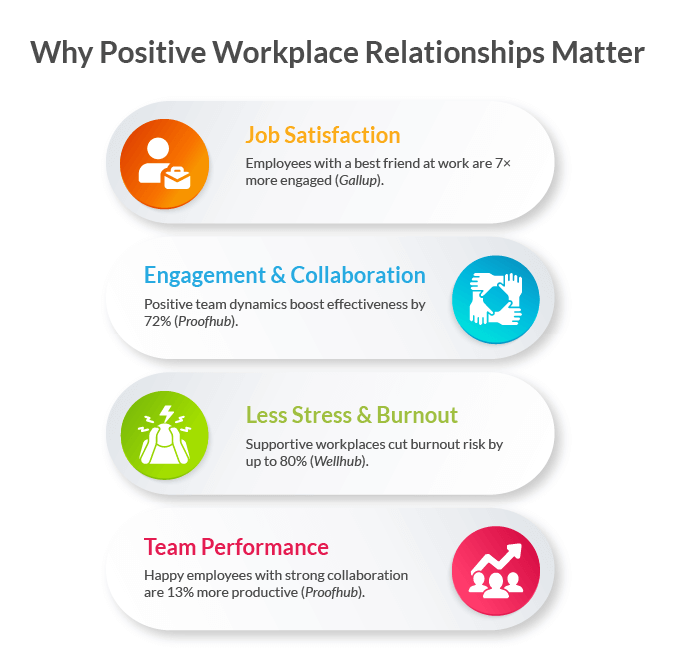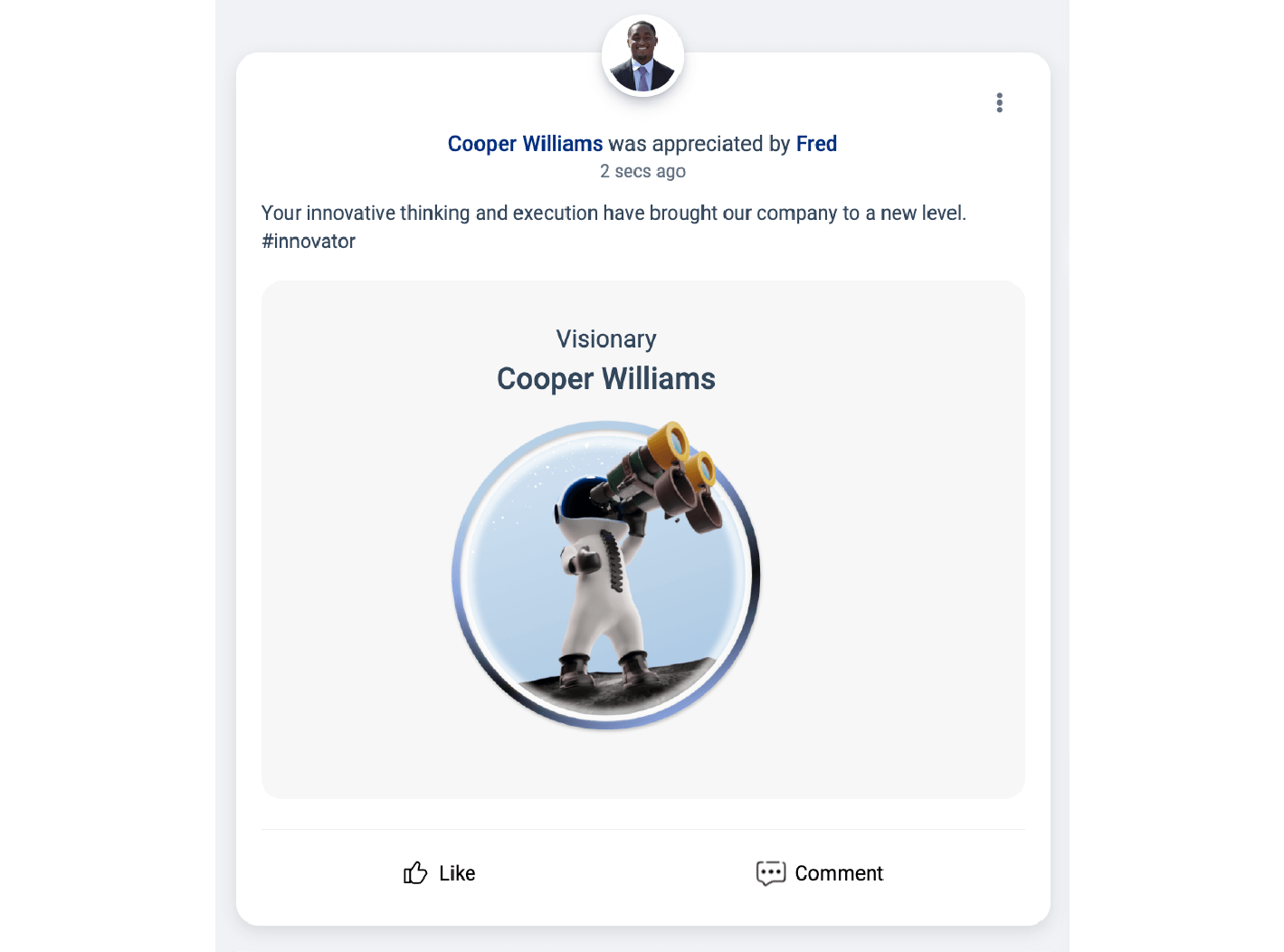9 Tips To Build Positive Workplace Relationships

A Global Employee Recognition and Wellness Platform
Were you aware that an average person spends approximately 90,000 hours working throughout their lifetime? This is equivalent to nearly one-third of a person's lifespan.
An employee spends a significant amount of time in the workplace. Creating positive relationships in that span of time is crucial.
A supportive workplace relationship ensures smoother transition through the daily monotony. It brings trust, respect, laughter, and above all, the willingness in employees to come to their workplace and do their best.
When we are connected and appreciated, we are happier, healthier, and more driven, aren't we? The workplace also benefits in terms of better cooperation, higher motivation, and thus improved performance - all contributing to a strong workplace culture.
If we must define what a positive workplace relationship is, it refers to professional and personal connection between individuals within a company. It ranges from formal ties like an employer-employee relationship to informal ones like workplace friendships.
Elements of a Good and Positive Relationship
-
Trust- Trust becomes the vital foundation for successful employees in bonding with others and building a healthy relationship. When there is trust, transparency follows. Furthermore, performance improves and communication enhances.
-
Respect- When there is mutual respect between employees, they value each other’s opinions and ideas. This leads to effective collaboration through which problem-solving becomes easy.
-
Mindfulness- Mindful Employees are careful with their words and are better listeners. They value others as much as they value themselves, never resort to negative thoughts, and emphasize a positive relationship.
Here’s why building strong workplace bonds makes all the difference.

Sources: Gallup | Proofhub | Wellhub | Proofhub
How to Build and Maintain Positive Relationships?
1. Open Communication
Excellent and open communication is the cornerstone of a healthy relationship between employees. Communication should always be transparent so that there is always a flow of information without interruption. Encouraging employees to have open communication with their peers creates a sense of psychological safety. This not only fosters friendship but also builds trust.
Thus, leaders could open up communication channels where everyone can connect and bond well to strengthen the organization.
2. Listening
People have this tendency to act that they are listening and miss out on the message that others have to convey. However, that should be avoided to foster a positive relationship in the workplace.
Everyone should pay attention when someone has to say something and focus on the message they want to convey. Try to see the bigger picture and the meaning behind a conversation and offer some insight after hearing the entire input.
3. Offer Support, But Let Others Choose
Through experience I’ve learned over time that when we help without being asked, we are, in a way, being disrespectful to ourselves and the other person.
It’s best to help others when someone specifically asks for help. Or, if you want to help, it would be better to ask the person, “Would it be helpful if I did …?”
This will allow the other person to make the choice. It gives them a chance to say yes or no. Otherwise, they might find it annoying when someone tries to jump right in and help, because they might be perfectly capable of doing the task at hand. But if you ask them or wait until they ask you, they are more likely to communicate with you in a decently acceptable manner.
4. Show Appreciation

Source: Vantage Recognition
Appreciating your peers and co-workers by far is the best way to build a healthy relationship. Always show appreciation when a colleague helps you out, or someone has achieved something greater within their stay in the organization. Even simple gestures like writing a simple appreciation note or giving a meaningful valentine’s day gift can go a long way.
This will help them boost their morale, but it will also help you bond well with other employees.
5. Handle Conflicts Respectfully
At any workplace, conflicts are inevitable. But how we manage them defines the culture. Good leaders realize that respectful conflict resolution is not about dodging disagreements. Rather, it is about dealing with them in a positive and constructive manner.
The idea is to promote open discussion and ensure that all viewpoints are heard without judgement. Your goal should be to lead your workers to a solution, not blame. While doing so, it is also important to empathy in your own interactions. Handled with respect and transparency, conflict can also present occasions for growth, innovation, and better workplace relationships.
6. Value others
Show value to others and the work they do. Learn to accept the way they perform their daily tasks. When you value their work ethics, your relationship with others transcends to a positive level on its own. Not only this works as a morale booster to others, but it also helps you build a good reputation within the organization.
7. Positive Attitude
You need to have an attitude that people like and find approachable. No matter whomever it is in the organization, if they have the right attitude, then it becomes appealing. People are more likely to talk and bond with those who show a positive attitude.
When you showcase positivity, it gets reflected in others as well—promoting a happy workspace.
8. Maintain Boundaries and Never Gossip
Before you bond well with someone in the organization, keep in mind to set certain boundaries. Keep a certain amount of time for bonding, and never let the social connection hamper your work in the long run and.
Once you can differentiate them, you will maintain a good relationship with others.
While we are talking about maintaining boundaries, one should also realize that gossiping is never a good idea. Office politics disrupt the working environment and hinders the relationships between co-workers.
If you have a conflict with someone, try to resolve it with open communication pinpointing the problem. This will resolve the conflict and will help you maintain a healthy relationship.
9. Celebrate Team Wins
The late organizational anthropologist Judith Glaser wrote in Psychology Today that celebrating team wins triggers feelings of “inclusion, innovation, appreciation, and collaboration”. These are precisely the elements that strengthen positive workplace relationships.
A Deloitte's research back this up and confirm that companies that regularly recognize and celebrate employee achievements experience a 14% boost in engagement and productivity.
And it’s true and we feel this ourselves, don’t we? We feel acknowledged and valued when someone recognizes our efforts and hard work. It boosts our motivation, creates a positive work culture, and helps us stay focused, even during stressful periods.
Tips To Build Positive Workplace Relationships In A Remote Or Hybrid Setup
In remote and hybrid workplaces, building positive relationships requires extra thought and consistency.
-
Frequent Touch Point: For those of you who are working to recreate the community and optimism of office spaces, as a leader of a team, having regular scheduled check-ins and virtual interactions is the easiest route to success.
-
Show Empathy During Time Zones: Schedules or personal challenges are sure to happen with a remote team. A little respect and understanding will go a long way to making your colleague feel valued and that their existence in the company is important.
-
Incorporate Inclusive Rituals: Fostering caring rituals, even simple ones, can begin to create an environment of team spirit and belonging. Things like having a digital recognition board (even if it just says, "thanks") or fun virtual Friday games will begin to foster a sense of belonging among teams.
-
Respect Boundaries: Support a work/life balance. There should be no texts or emails after-hours or at weekends, unless there is an emergency. When these boundaries are understood and practiced, relationships can be formed within respect and trust.
Summing It Up
Healthy and positive work relationships will make your job less stressful and enjoyable. It will cut out the mundane factor that often plagues an employee in the long run. A company culture that encourages employees to maintain healthy relationships can go a long way towards enhancing employee well-being.
Frequently Asked Questions About Positive Workplace Relationships
1. What is a positive relationship in the workplace?
A positive relationship in the workplace is built on mutual trust, respect, and open communication among colleagues. It fosters teamwork, reduces conflict, and creates a supportive environment where employees feel valued and motivated.
2. What are the four types of work relationships?
The four main types of work relationships are: peer-to-peer (colleagues on the same level), manager-subordinate, mentor-mentee, and team or cross-functional relationships. Each plays a unique role in collaboration, learning, and career growth.
3. What are the key components of a positive relationship?
The key components include trust, respect, empathy, communication, and collaboration. When these elements are present, employees can work more effectively and maintain a healthy, productive workplace culture.




















